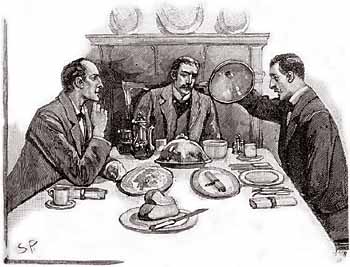
Last week’s story for the Chronological Sherlock Holmes Challenge is “The Adventure of the Naval Treaty.” This story is not completely dissimilar from “The Beryl Coronet” or “The Second Stain.” In all three stories, a high-ranking official is given something of great importance and finds it has been stolen. Of course, the man will be ruined utterly if the missing object cannot be located. In the case of “The Naval Treaty,” an old school friend of John Watson’s, Percy Phelps, has risen to high office with the help of his uncle (the term nepotism was invented to describe such circumstances), and his uncle asks him to copy out a sensitive naval treaty with Italy. As he is doing so, he finds he’s very sleepy, and he must finish the task. He rings for coffee, and when the charwoman goes to inform her husband, the butler, to make the coffee, Phelps copies out a bit more of the document. He waits. No coffee. He goes downstairs to find the kettle boiling over and the butler asleep. In the time he takes to sort out the coffee, he hears the bell used to summon the butler and dashes upstairs, but the treaty is gone. He falls into a desperate illness and writes Watson to see if his friend Sherlock Holmes can help.
Despite its similarity to the other stories, I felt the mystery and Holmes’s deduction were both more interesting and better executed in this particular story. Holmes’s character is also interesting. For instance, he stops to observe the beauty of a rose:
“What a lovely thing a rose is! …
Our highest assurance of the goodness of Providence seems to me to rest in the flowers. All other things, our powers, our desires, our food, are really necessary for our existence in the first instance. But this rose is an extra. Its smell and its colour are an embellishment of life, not a condition of it. It is only goodness which gives extras, and so I say again that we have much to hope from the flowers.”
Watson is as perplexed as anyone by this strange observation, and another about the school buildings “rising up above the slates, like brick islands in a lead-coloured sea,” which can be viewed as Holmes and Watson ride back on the train, follows his curious observation about the rose. Both observations are notable for their strange optimism. In any case, there is humor and a fairly intriguing mystery at the heart of this story, along with a false lead. Holmes’s revelation of the case at the end includes an unusual flair for the dramatic as well. I enjoyed this one. I didn’t notice any references to this story in the Sherlock series.
Rating:




 I read this story as part of the Chronological Sherlock Holmes Challenge. It is the eleventh story in the chronology (time setting rather than composition). Next up is “The Crooked Man.”
I read this story as part of the Chronological Sherlock Holmes Challenge. It is the eleventh story in the chronology (time setting rather than composition). Next up is “The Crooked Man.”